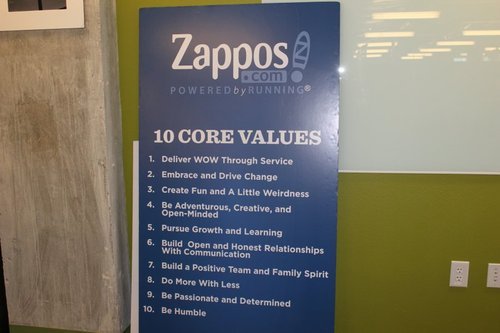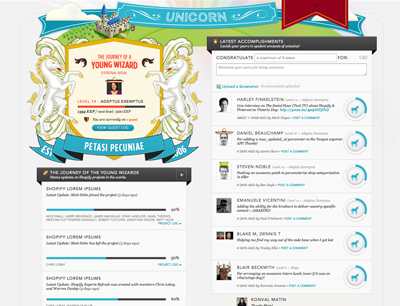We’ve seen an interesting trend at companies that are extremely culture-focused: the culture hacker. Software developers have built internal developer productivity tools since time immemorial because great engineering cultures push for automation and improving iteration speed. But now developers are turning their attention to addressing team dynamics and how the whole company functions and works together on the whole — in a word, culture.
Zappos: making values concrete with process and code
At many companies, company values are just words on a piece of paper tacked to a wall somewhere. At Zappos, they’re extremely thoughtful about giving their values bite. For example, they’re famous for paying new employees to quit. After new employee training ends, each employee is offered the opportunity to quit their job and walk away with $1,000. They do this because one of the Zappos core values is “be passionate and determined”, and paying people to quit ensures that those who remain are incredibly enthusiastic about their work and in it for the long haul.

They take it a step further by using code to reinforce cultural values in individual workflow. As Zappos has grown from a small startup to a 1,500+ employee company, it’s had to scale its value of having a tight-knit team and family-like atmosphere. It was a natural fit to help those relationships scale through technology.
Zappos has what’s called a “Face Game”. When you log into the computer system, after you enter your password, a face pops up of a fellow employee and you’re asked to enter the person’s name. Whether you answer correctly or not, you see a bio and profile – another way of getting to know your fellow workers and building culture.
https://www.youtube.com/watch?v=zghi4q3ENE8
(Source: https://www.youtube.com/)
During a recent visit to Las Vegas, we met Darshan Bhatt, a developer at Zappos who spends 100% of his time on building internal culture products that empower everyone in the company to make Zappos culture their own.
For instance, Zappos conducts monthly surveys to gauge the happiness of employees in the company. At another company, the survey results might be something management discussed behind closed doors to determine, at most, where in the company to deploy more pizza parties. At Zappos, Darshan builds tools that empower every employee with the data necessary to improve culture and happiness in the company.
Darshan showed us an application he was building that every employee in the company would get access to that allowed you to plot anonymized survey responses along different employee demographic information. He showed us an example where he plotted employee tenure length versus reported employee happiness. This gave insight into whether every stage in an employee’s lifecycle at the company was being properly supported and put the power of that data in the hands of every employee to make improvements.
Shopify: developers working with the human relations team to reinvent HR
Shopify is a hugely successful e-commerce software platform based out of Ottawa, Canada, that has a remarkable company culture. They have a two-person team called Shopify Labs which is focused on building internal tools. What surprised and impressed me was the tight-knit relationship the Labs team has with HR in working together to build culture products.
At your average company, you’ll likely see a sharp division between front office and back office teams like HR. You might even see a contentious relationship if HR is focused too much on compliance/CYA and running employees through an impersonal annual review process. Shopify CEO Tobi Lutke made the point to us that they call HR “human relations”, not “human resources” to reinforce HR’s cooperative, culture-focused role at Shopify.
The Labs team together with HR built an application called Unicorn to recognize employee accomplishments in a fun, peer-sourced way.

When Serena does something great, Daniel gives her thanks by going into Unicorn, logging her accomplishment, and giving her one, two or three unicorns. Everyone in the company sees Serena’s plaudits and can pile on more unicorns if they agree that she did an awesome job.
At the end of month, every employee in Shopify gets allocated a proportion of the company’s profits that are set aside for Unicorn bonuses. Daniel’s allocation goes to Serena and anyone else to whom he’s given unicorns over the course of the month.
Unicorn gives the power of employee recognition and even bonus disbursement to every employee in the company, not just to managers and HR. The tight working relationship between Shopify Labs and HR makes the cultural value of peer recognition real and vibrant through software.
Why the culture hacker matters
Bestselling author Dan Pink told us that the biggest trend happening today that’s disrupting enterprise organization is that “talented people need organizations less than organizations need talented people.”
We’re seeing how company culture is becoming a huge differentiator in attracting and retaining top talent, and this is doubly true for the companies that truly walk the walk, not just talk the talk. Companies on the bleeding edge of focusing on company culture like Zappos, Shopify, Github, and Stripe are investing developer time — the most valuable resource at a software company — to make cultural values real through software.
